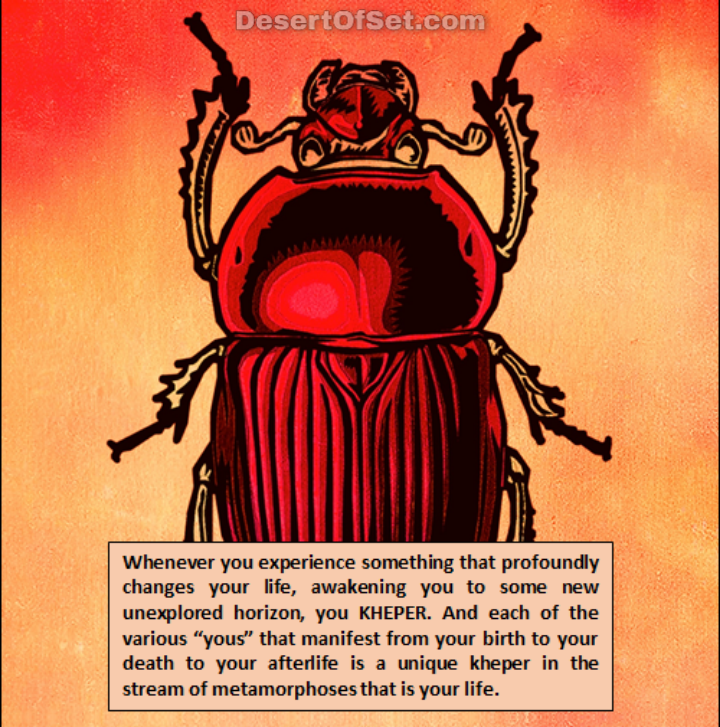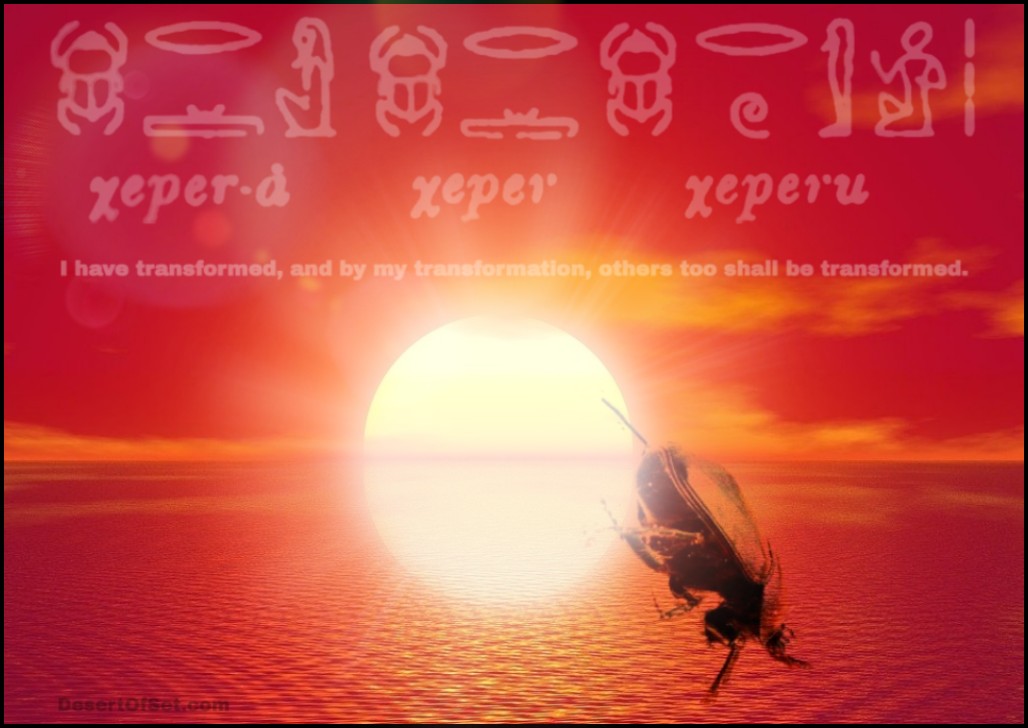Explaining kheper, the ancient Egyptian concept of divine transformation, and how it relates to the scarab beetle, the solar Creator deity Atum-Ra, and Set as the Champion of Ra.

In Egyptian mythology, the solar deity Ra (or to be more specific, Atum-Ra) is not only our literal sun, but the first God, the progenitor of all things, and the divine spark that’s hidden within every person. They are the starfire from which our planet and our very bodies are forged, and I refer to them with gender-neutral pronouns as much as possible, given they are also known as “the Great He-She.”
Ra is not said to design the universe like an architect, but to asexually reproduce it through an act of divine masturbation (both a theological and a literal “Big Bang,” you might say), right after creating themself through an act of divine introspection. First Ra lifts themself from Nun, the primordial ocean of infinite chaos, proclaiming, “Khepera Kheper Kheperu”—which means something to the effect of:
“I have transformed,
and by my transformation,
others too shall be transformed.”
Then Ra asexually begets the infinite plurality of Gods, animals, and people that exists today. Every sentient being is, in fact, a miniature alternate Ra within the macrocosmic collective Ra, right on down from the highest of the Netjeru to the tiniest baby animal or human.
Ra’s first children, Shu and Tefnut, were separated from the Self-Created One shortly after their births. So Ra removed one of their glowing Eyes, which became the solar cow Goddess Hathor, and sent her to search for the missing children. By the time Hathor reunited Shu and Tefnut with Ra, the children had come of age and produced babies of their own: the sky Goddess Nut and the earth God Geb (who would later beget Osiris, Isis, Set, and Nephthys). And when Ra was reunited with all these children, they wept the happy tears that fell down to Geb and mixed with the earth, becoming the first human beings. So while the Gods might be greater and more powerful than us, every person is a living demigod, a human particularization of the Great He-She, and we possess certain rights and dignities even the Netjeru can’t take away. We are not their creations or their playthings, but something more like their younger cousins.
At a later point in the myth cycle, Ra says they are “Khepera at dawn, Ra at midday, and Atum at sunset.” They are a child in the morning, an adult in the afternoon, and an elder in the evening. When night falls, Ra dies and becomes a ghost or “Night Sun” that journeys through the Underworld to be reborn again as Khepera. It is in the darkest hours before dawn that they are attacked by the Chaos Serpent, which is safely repelled by Set and His starry Iron. This is not just a solar myth, but an allegory for the sleep cycle. Many of the Netjeru are said to follow Ra’s same pattern of dying and rising, sleeping and reawakening, just as we ourselves do every day. And just as the Serpent’s assault on Ra is truly an assault on every God and mortal by extension, so too is Set’s battle with the monster a battle for all of us, from the Creator themself to that angry customer you have to deal with at work. Set is the God who never dies and who never sleeps, that the rest of us may all sleep and die and awaken and rise again in safety.

The name Khepera is especially interesting because it is related to the word kheper, which has at least two interrelated meanings. The most obvious translation is “scarab beetle,” an insect that is sacred to Ra. The Egyptians admired scarabs for their life cycle (from egg to larva to pupa to adult), and for their unique reproductive behavior. They lay their eggs in dung, which they then roll into large balls and move around as needed. People drew parallels between these egg-filled dung balls and the sun, imagining that Ra rolls a giant radiant egg ball across the sky. Furthermore, the scarab’s life cycle was likened to Ra’s cycle from night/ghost to dawn/child to noon/adult to dusk/elder, which brings us to the second translation for kheper. As a verb it means “to transform,” and as a noun it means “a transformation.” Whenever you experience something that profoundly changes your life, awakening you to some new unexplored horizon, you KHEPER. And each of the various “yous” that manifest from your birth to your death to your afterlife is a unique kheper in the stream of metamorphoses that is your life.
Considering that kheper is encoded in Ra’s first words at the Dawn of Time (“Khepera Kheper Kheperu”), this is an extremely powerful “magic word” indeed. So powerful, in fact, that when Michael Aquino, a leading minister in the Church of Satan, invoked “the devil” for guidance on what to do following a schism in the church in 1975, he was answered not by Lucifer but by Set, who permanently impressed the concept of kheper on Aquino that very night. Aquino and his colleagues in the Temple of Set prefer to capitalize and spell this word with the Greek letter chi (i.e., Xeper) to signify its centrality to their particular Setian current. I prefer to spell the word phonetically to prevent any confusion for my readers, and I diverge from Temple of Set members insofar as my love for Set is prioritized over kheper in my hierarchy of spiritual values. I agree kheper is important, and that Set cares more about getting us all to kheper than being worshiped. Nevertheless, I identify as a Setian because I love Set first and foremost; if kheper or Khepera were truly the central focus of my path, I would identify as a Kheperian instead.
That being said, kheper is what happens when the sun rises at dawn, when a grub emerges from the soil as an adult beetle, and when a soul or spirit is fundamentally transformed by some profound, life-altering experience. It is the principle that enables us all—cosmic God and mortal demigod alike—to theoretically live beyond death. Additionally, Set is the only other deity in the Ennead or Company of Nine to have willed Himself into existence apart from Ra (by tearing Himself from the womb of His mother, Nut). Since the Netjeru are both distinct beings and extensions of Ra’s own primeval essence, the argument can be made that Set is the aspect of Ra that enabled them to kheper in the first place, even before Big Red came forth as an entity in His own right. This would explain why He continues to play such an important role in procuring Khepera’s safe rebirth, both in the macrocosm and the microcosm. Similar to how St. John believed Christ was with Yahweh in the beginning, before the Creation of heaven and earth, you might say I believe Set was with Ra in the beginning, before the Dawn of Time.

